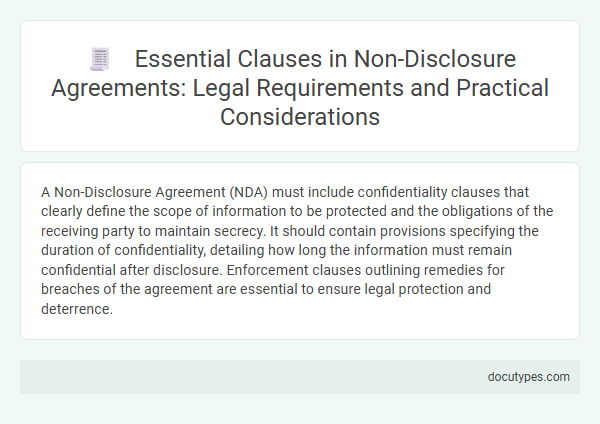A Non-Disclosure Agreement (NDA) must include confidentiality clauses that clearly define the scope of information to be protected and the obligations of the receiving party to maintain secrecy. It should contain provisions specifying the duration of confidentiality, detailing how long the information must remain confidential after disclosure. Enforcement clauses outlining remedies for breaches of the agreement are essential to ensure legal protection and deterrence.
Introduction to Non-Disclosure Agreements
Non-Disclosure Agreements (NDAs) are legal contracts designed to protect confidential information shared between parties. Understanding the essential clauses within an NDA is crucial to ensure comprehensive protection.
- Definition of Confidential Information - Clearly specifies what information is considered confidential to prevent ambiguity.
- Obligations of the Receiving Party - Outlines the responsibilities of the recipient regarding the use and protection of the confidential information.
- Duration of Confidentiality - Determines how long the confidentiality duties remain in effect after the agreement is signed.
Including these clauses in an NDA helps safeguard sensitive data and maintain trust between parties.
Importance of Essential Clauses in NDAs
What types of clauses must be included in a Non-Disclosure Agreement to ensure its effectiveness? Essential clauses such as Definition of Confidential Information and Obligations of Receiving Party protect sensitive data. Including terms on Duration and Exclusions clarifies the scope and limits of confidentiality, safeguarding Your interests.
Definition of Confidential Information
| Clause Type | Description |
|---|---|
| Definition of Confidential Information | The clause clearly specifies what constitutes confidential information under the agreement. It defines the scope of protected data, including written, oral, electronic, and digital formats. Typically, it covers business secrets, financial data, client lists, technical specifications, trade secrets, and proprietary information. Exclusions such as publicly available information or data independently developed without reference to the disclosed material are also identified. |
| Obligations of Receiving Party | Details the responsibilities of the party receiving confidential information, including limits on use and disclosure. |
| Term and Duration | Specifies the time frame during which the confidentiality obligations apply. |
| Permitted Disclosures | Lists exceptions where disclosure is allowed, such as legal requirements or prior consent. |
| Remedies and Consequences | Outlines the legal actions or penalties in the event of breach of confidentiality. |
Obligation of Confidentiality
A Non-Disclosure Agreement (NDA) must include a clear Obligation of Confidentiality clause to ensure parties commit to protecting sensitive information. This clause defines the scope and nature of the confidential information covered under the agreement.
The Obligation of Confidentiality specifies how the information must be handled, including restrictions on disclosure and use. It also outlines the duration of the confidentiality obligation, ensuring protection extends beyond the termination of the agreement.
Permitted Disclosures and Exceptions
Non-Disclosure Agreements (NDAs) require clear clauses outlining permitted disclosures and exceptions to protect sensitive information while allowing essential communication. These clauses define the boundaries of confidentiality and exceptions to ensure legal compliance and operational flexibility.
- Permitted Disclosures to Legal Authorities - This clause allows disclosure of confidential information when required by law, subpoena, or regulatory orders to comply with legal obligations.
- Disclosure to Affiliates or Representatives - This provision permits sharing information with employees, agents, or consultants who need access to fulfill the agreement's purpose, under the same confidentiality terms.
- Exceptions for Public Domain Information - Information already publicly available or independently developed is excluded from confidentiality restrictions to prevent unnecessary limitations on disclosure.
Duration and Term of Confidentiality
The duration and term of confidentiality are critical clauses in a Non-Disclosure Agreement (NDA). These clauses specify how long the recipient must maintain the confidentiality of the disclosed information.
- Fixed Term Clause - Defines a specific time period during which the confidentiality obligations remain in effect.
- Survival Clause - Ensures confidentiality continues even after the NDA or business relationship ends for a designated timeframe.
- Indefinite Duration Clause - Requires the recipient to keep information confidential indefinitely, often used for trade secrets.
Remedies for Breach of NDA
Non-Disclosure Agreements (NDAs) must include specific clauses to protect confidential information and outline the remedies available in case of a breach. These remedies ensure that your proprietary data remains secure and that legal actions can be taken if the agreement is violated.
Key clauses related to remedies for breach of NDA typically include injunctive relief, which allows the injured party to seek a court order preventing further disclosure. Monetary damages are also specified to compensate for losses caused by the breach. Additionally, the agreement may include provisions for arbitration or mediation to resolve disputes efficiently and maintain confidentiality.
Legal Requirements for Enforceability
Non-Disclosure Agreements (NDAs) must include specific clauses to ensure legal enforceability. Essential clauses typically cover the definition of confidential information and the obligations of the receiving party.
Clauses detailing the duration of confidentiality and permitted disclosures are also crucial. Your NDA should explicitly state remedies for breach to protect your interests effectively.
Practical Tips for Drafting Effective NDAs
Non-Disclosure Agreements (NDAs) must include confidentiality clauses that clearly define what information is protected. Enforcement clauses outlining the consequences of breaches ensure legal accountability. Practical tips emphasize precise language and tailored scope to suit specific business needs, enhancing your agreement's effectiveness.
What Types of Clauses Must Be Included in a Non-Disclosure Agreement? Infographic

